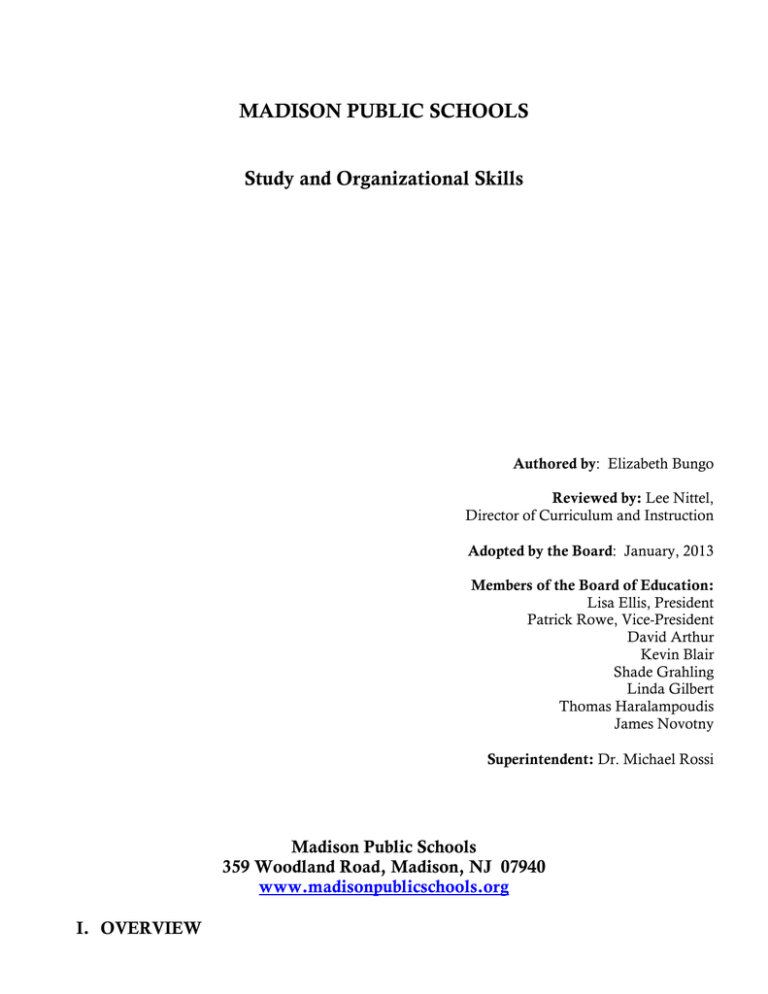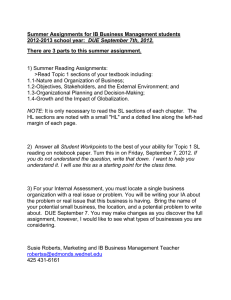MADISON PUBLIC SCHOOLS Study and Organizational Skills
advertisement

MADISON PUBLIC SCHOOLS Study and Organizational Skills Authored by: Elizabeth Bungo Reviewed by: Lee Nittel, Director of Curriculum and Instruction Adopted by the Board: January, 2013 Members of the Board of Education: Lisa Ellis, President Patrick Rowe, Vice-President David Arthur Kevin Blair Shade Grahling Linda Gilbert Thomas Haralampoudis James Novotny Superintendent: Dr. Michael Rossi Madison Public Schools 359 Woodland Road, Madison, NJ 07940 www.madisonpublicschools.org I. OVERVIEW The cycle course Study and Organizational Skills is designed to aid students in overcoming weaknesses in their work and study habits. The main purpose of this curriculum is to provide students with a solid and thorough background in study and organizational skills by consistent monitoring during the 9 week course. The curriculum is divided into three areas: organizing time, organizing school materials and work space, and study skills. These skills will be taught using content and materials from subject area classes. Through presentation of the skills the student will be able to determine what is required to be successful in school. Individual class lessons will teach students to develop a variety of study skills and to function more effectively in school. II. RATIONALE All students benefit from having good organizational skills. These skills help students to: ▪ ▪ ▪ ▪ ▪ ▪ ▪ Evaluate and improve their study habits. Budget their time. Establish priorities and goals. Make effective use of their notebook, calendar, and homework assignment pads. Take notes with better results. Use various techniques when studying for tests. Organize papers, schedules, and assignments. Having effective organization and study skills is an important life skill. Students who can budget their time, exhibit effective study habits, and handle their studies in an organized manner will likely also have a successful academic experience in school and a successful work experience. III. STUDENT OUTCOMES (Link to NJ Core Content Standards) At the end of this course, students will be able to : A. B. C. D. organize time effectively. organize work materials, notebooks, and work space appropriately. organize class assignments and homework. use various study skills techniques to improve performance on classwork and tests. STANDARD 3.1 (Reading) All students will understand and apply the knowledge of sounds, letters, and words in written english to become independent and fluent readers, and will read a variety of materials and texts with fluency and comprehension. STANDARD 3.2 (Writing) All students will write in clear, concise, organized language that varies in content and form for different audiences and purposes. STANDARD 3.4 (Listening) All students will listen actively to information from a variety of sources in a variety of situations. IV. ESSENTIAL QUESTIONS AND CONTENT IV. ESSENTIAL QUESTIONS AND CONTENT STANDARD 9.1 (Career and Technical Education) All students will develop career awareness and planning, employability skills, and foundational knowledge necessary for success in the workplace. IV. ESSENTIAL QUESTIONS AND CONTENT IV. ESSENTIAL QUESTIONS AND CONTENT A. How can students organize their time? • Use homework assignment pad • Set goals and priorities • Break down long term assignments into manageable parts • Complete assignments • Use a planning calendar B. How can students organize school materials and work space? • School Materials • Notebooks • Textbooks • Writing utensils • Assignment pad • Locker • Bookbag • Work Space • Study space at home and school • Desktop C. What study skills should students exhibit? • Preparing for Tests • Use note cards for vocabulary • Learn effective study strategies • Organizing Classwork • Outlining • Note-taking • Paraphrasing • Report writing • Paragraph development V. STRATEGIES Instructional strategies may include: • Cooperative learning activities • Interactive lectures using multimedia • Teacher created graphic organizers and checklists VI. EVALUATION Assessment strategies will/may include: • Notebook and assignment pad checks • Class projects such as creating study games • Class presentations including role-play activities • • Student generated checklists Study games VII. REQUIRED RESOURCES Useful websites test taking tips, note taking, study skills http://www.testtakingtips.com/ Organizational Skills http://www.naz.edu:9000/~dekunkel/Organizational%20Skills.htm Study skills http://www.homeworkandstudyskills.com/studylinks.html On-line study skills survey http://www.ucc.vt.edu/studyskills/ssaform.htm Who wants to be a millionaire study skills game http://www.hutchcc.edu/faculty/murphye/studyskills.htm Test taking skills Jeopardy game http://www.hutchcc.edu/faculty/murphye/testtaking.htm On-line Learning styles questionnaire http://www.engr.ncsu.edu/learningstyles/ilsweb.html and http://www.usd.edu/trio/tut/ts/stylest.html Printable learning styles test (attached to curriculum) http://www.rrcc-online.com/~psych/LSInventory.html Visual vs. Auditory Learners http://www.newkerala.com/self-help/Articles/What-Type-of-Learner-Are-You?.html VIII. SCOPE AND SEQUENCE Week 1 • Teacher shows introductory PowerPoint presentation found in Faculty/Study Skills folder on the network. • Students set up notebooks, folders, assignment pads according to teacher model. • Students gather all supplies (highlighters, folders, pencil case, etc.) needed for class. • Teacher demonstrates/explains importance of good study skills. Day 1 and 2 *A PowerPoint presentation for one of the first days of class is attached and can be found in the MJS/FACULTY/study skills folder Day 1 and 2 – will be devoted to the proper notebook set up 1. 3-ring binder 2. in the binder in the following order a. pencil case b. assignment pad (optional – can be kept outside of notebook) c. Trapper folder (labeled with first period’s subject) d. notebook paper e. Trapper folder (labeled with second period’s subject) f. Notebook paper Week 2 • Organization of Work Materials and Work Space A. Objective: At the end of this unit the students will be able to: 1. develop and maintain an organized notebook. 2. use a homework assignment pad correctly. 3. develop the proper study environment. 4. keep their lockers organized. 5. come prepared to class with writing utensils, homework, textbook, and notes. B. Activities 1. Teacher will check homework assignment pads daily. 2. Students will use a three ring binder notebook with sections and folders for each subject. 3. Students will organize notebooks and bookbags on a daily basis. 4. Students will organize their lockers weekly or as necessary. 5. Students will enter the classroom each day and have only a pen/pencil, homework assignment pad, and notebook on their desks. Week 3 - 4 • Organization of Time A. Objective: At the end of this unit the students will be able to: 1. use a calendar and assignment pad to set priorities in scheduling work assignments. 2. complete long-term assignments. 3. complete all homework assignments. 4. hand in all assignments on time. 5. set realistic goals. 6. plan for flexibility. 7. use a long range planner/calendar. B. Activities 1. Students will use a daily homework assignment pad. 2. Students will organize their time by using a large wall calendar. 3. Students will break down long term assignments into manageable units with the aid of the teacher. 4. Students will determine what things need to be done and how much time is available to them. 5. Teacher will introduce and discuss time management techniques with students using appropriate materials. 6. Teacher will monitor the student's time management techniques and periodically discuss progress with the student. Week 5 – 9 *The study skills will be taught in the order that reflects what is occurring in the content area classes. For example, if a vocabulary test is being given in English that week, then the study skill being taught would be using note cards, mnemonics and other memory techniques to study for such a test. • Study Skills A. Objective: At the end of this unit, students will be able to: 1. Complete all assignments neatly. 2. Follow all directions given by the teacher in completing assignments. 3. Utilize effective note-taking skills. 4. Use various study skills (underlined below)*. 5. Organize classwork and skillsheets by putting assignments in the appropriate subject section in the rings of binder. 6. Improve their written language. B. Activities 1. Students will come to class prepared. 2. Students will use a checklist to make sure they have included all of the essentials for an assignment before handing it in. 3. Students will hand in homework every day, 4. Students will fill in the homework assignment pad completely. 5. Students will begin homework in class with teacher monitoring. 6. Teacher will model proper homework completion. 7. Students will play the note card game to learn how to review vocabulary. 8. Teacher will lead a discussion of mental memory vs. physical memory. 9. Teacher will lead a sample outlining lesson using the LCD. 10. Teacher will model note-taking skills on the LCD. 11. Teacher will use modifying activities for paraphrasing. 12. Students will use a report writing plan. A suggested typical 40 minute class period 1. As soon as students sit down, they are to have nothing on their desks but their assignment pad and a pen/pencil. 2. Teacher will have written the day and date on the board. 3. Students should be filling in TODAY’s day and date (if necessary) and filling in any homework, tests or quizzes, or any long term assignments given so far. 4. Teacher will be walking around the room and checking assignment pads for today’s information AS WELL AS checking the previous day’s assignments being sure that the student had filled in everything completely and handed in all assignments. 5. Teacher will then use the large wall calendar to write down any up coming test/quizzes/long term assignments. Teacher will remind students to do this on their calendars at home. 6. Students will then clear their desks and have out only what the teacher asks them to have out. A class rule is that the only things allowed on the desk are the materials a student is currently using. 7. The next part of the lesson depends on what the students have as homework or classwork in the content area classes. A lesson should be taught using that work to teach the lesson. For example, if the students have a vocabulary quiz in English coming up, the lesson for the day will be how to study for that quiz. Students will make note card (using the appropriately colored note card) for each word with the word on one side and the definition on the back. A lesson on memory techniques will also be taught for some of the words. For example, the word ‘pugnacious’ means wanting to fight. The teacher will tell the class to picture a pug (dog) fighting with a bunch of other dogs. At the end of the lesson, the teacher will remind the students to study their note cards with a friend/parent and that quizzing each other is a very effective way to study. Notebook organization Keeping notebooks, backpacks, and lockers organized is an essential ingredient for success. Teachers will check students’ notebooks and backpacks once per week. The following things are not allowed: 1. papers that are not in a folder or in the rings of the binder 2. papers with holes punched in them that are in the folders – they belong in the rings 3. papers in the wrong subject area 4. old papers that the student no longer needs 5. papers with the 3 holes ripped – they must be reinforced The teacher will hold an “inspection” at the end of the period and be sure that notebooks pass inspection. Study skills to be taught after the assignment pad is checked (Reminder: these lessons must be taught using the content from their classes at the same time that that particular skill is necessary) 1. How to take notes from a chapter in a text book 2. How to take notes onto note cards Useful Note taking Website http://www.education-world.com/a_lesson/lesson/lesson322.shtml 3. 4. 5. 6. 7. How to write a research paper (attached) How to organize materials for a test How to break down large assignments into smaller parts More study strategies such as using mnemonics How to take a test




